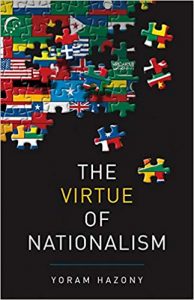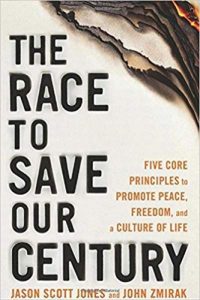From The Stream
By JASON JONES & JOHN ZMIRAK
We’ve written it here before. Events today read like the plot of some anti-utopian novel. Indeed, the past 10 years or so have seemed as if they were scripted from beyond the grave. By whom? A “dream-team” of far-seeing, bitter social critics. Imagine some ghostly conference table manned by Ayn Rand, Evelyn Waugh, Aldous Huxley, George Orwell, Anthony Burgess … and Ira Levin.
You might not recognize the last author’s name, but you’ve probably savored his stories. A gifted American author, he penned such classic page-turners as Rosemary’s Baby, The Boys From Brazil, and The Stepford Wives. Fewer people know one of the few novels he wrote which didn’t become a movie, but really needs to: This Perfect Day. The fascinating podcast Dangerous History grouped it together with Brave New World and 1984 as one of the last century’s most prophetic novels.
Maybe the real world would be less like an anti-utopian novel if our leaders took time to read some. Papal spokesman Fr. Antonio Spadoro, for instance, probably wouldn’t lecture believers that “two plus two can equal five” if he’d read his Orwell. He’d know why such statements strike us as … unsettling.
The Novel Globalists Should Be Forced to Read
Who needs to read This Perfect Day? First of all, Pope Francis. Next, every leader in the European Union. They should pass their copies along to the editors of major newspapers and journals, who in turn should make the novel a kind of bible. It should sit alongside the style guide in every journalist’s cubicle or writing den. Anyone who warns of or scoffs at “nationalism” and “populism” should have to read every last page.
Globalism is just Imperialism in drag.
Why? Because Levin more than anyone depicted the world such people are trying to make. In the novel, a global therapeutic state run by paternalistic humanitarians keeps the earth at peace. It suppresses all crime, and most interpersonal conflict. There are no borders, no armies and barely any police. If Immanuel Kant had been blessed with literary talent, this is how he would have sketched out the world-state he advocated.
One Big Happy “Family”
There are trade-offs, to be sure. Every single member of the global “Family” receives biweekly “treatments.” This cocktail of puberty blockers, tranquilizers and psychoactive drugs keeps men from growing beards or getting aggressive. It stops women from growing breasts or getting pregnant — except when the global algorithm decides it wants another child. A central computer, the god-like Unicomp (“Uni”) determines … everything. What subjects each student takes in school. Which career path he follows. Whether or not he may breed. To stop unproductive wasting of time, Uni even determines where he can go and when. Each person wears a scanner bracelet, which he must swipe to see if Uni wants him to enter a given building. Or get on a plane, a train or driverless automobile
Help us champion truth, freedom, limited government and human dignity. Support The Stream »
Those with adjustment issues go to meetings with their Counselors. And yes, every citizen gets one. They serve as therapists, social workers and father confessors. They catechize each Member of the Family to “thank Uni” for each good thing that happens. And to submit themselves with perfect docility to the all-good, all-knowing, all-seeing Will of Uni.

The Nightmare Our Elites See as a Beautiful Dream
And isn’t that pretty much the world that globalists seem to have in mind? Some might tweak one detail or two. But the worldwide Family, tended like one vast flock of sheep by all-wise elites? That’s the dream scenario embraced by globalists. When you drag it from the gauze-filtered realm of abstraction and enflesh it in gritty detail (as Levin did), this is the world they want.
And it looks a lot like an empire. In fact, the brilliant Israeli political philosopher Yoram Hazony has stepped forth to call it just that. In his new book The Virtue of Nationalism, Hazony boldly dissents from the globalist orthodoxy blandly accepted by nearly every “respectable” intellectual in the West. Hazony explains that historically we’ve seen only three broad philosophies of governance:
- Tribalism, which relies on ties of blood, creed or conquest to unite citizens around a common goal. Its triumph leaves a patchwork of small, war-ridden clans like North America before Columbus.
- Imperialism, which touts universal ideals and goals that logically drive empires to seek worldwide domination, and the universal “peace” that comes from total submission to one central authority, from which there is no escape on earth. And:
- Nationalism, which while it can be perverted, stands as the Golden Mean between these two extremes. It smooths out the constant conflict among competing tribes. But it leaves space for diversity of cultures, religions and political systems. Like the free market, it counts on them to compete, allowing the best ideas to last the longest and perhaps spread by imitation.
Apply each of these three philosophies to economics.
A Free Market of Nations
Tribalism generates the chaos of unguarded property rights, rampant theft and devastated “commons.” No one owns anything securely, so everyone has the motivation to plunder it. (Native Americans hunted some native species almost to extinction, long before Europeans arrived.) That’s the sad state of many poor countries today, such as Honduras and large parts of Mexico. Cartels replace tribes and reduce the state’s monopoly of power to a sad, symbolic figment.
Imperialism generates socialism, or its moral equivalent in monopolistic crony capitalist enterprises such as Facebook, Google and Twitter. The interchangeable operatives who flit back and forth from “government” to “industry” collaborate to liquidate competition. Then centralize economic and cultural power in the hands of the few, the wise, the enlightened.
What is literally the most dangerous thing on earth? Granting limitless power to global elites, unbounded either by loyalty to national traditions or a transcendent moral Law.
Nationalism is akin to capitalism. It allows nations to promote their competing cultures and systems, attracting or repelling citizens the way companies do consumers. The variety of nations serves as a laboratory of innovation and experiment. And truly dissatisfied citizens can vote with their feet by emigrating. Political dissidents have at least some hope of finding refuge in exile. That’s of course impossible with a global, unified state.
Imperial Wars Have No Limits
At this point haters of nationalism will surely blurt out, “But … warfare! Hitler! The Holocaust!” Hazony anticipates their arguments. He notes that tribal societies, from America before Columbus to hunter-gatherer societies today, were marked by constant, low-level war and savage conquest. What’s more, the most destructive wars in Western history were driven by empires, not nations. Rome seeking total dominion over the Mediterranean. Arabs, then Turks, trying to conquer the entire world for Islam. Holy Roman Emperors trying to wipe out Protestantism and impose a centralized rule on Europe. Napoleon doing the same for the Revolution. Then the German Empire and the Russian Empire clashing over who would rule eastern Europe. That’s what sparked the First World War. Finally, the brutal conflict between Hitler’s imagined pan-European “Aryan” empire, and Stalin’s Communist one.
In each case, the greedy empires dashed their hopes against the rocks of solid, limited, national loyalties. Think of Churchill defying the massed force of Hitler’s Europe.
Why They Hate Israel
Today, as Hazony points out, Israel stands as an anomaly. It’s rooted in rock-ribbed national sentiment and religious tradition. That’s why the left feels free to enable or even embrace Islamic anti-Semitism.

In our own book of political philosophy, The Race to Save Our Century, we warned against the dangers of militarism and racist nationalism. But we also wrote of how crucial it is to limit centralized power. What is literally the most dangerous thing on earth? Granting limitless power to global elites, unbounded either by loyalty to national traditions or a transcendent moral Law. That’s why we agree that the nation, for all its flaws, can embody the Golden Mean between tribalist chaos and suffocating globalist conformity. It stands as the sane middle ground between head-hunting clans and haughty, strutting imperial satraps. It’s the vision of limited government and a humane economy that inspired America’s founders.
And it’s what we need to defend against the allurements of soulless utopians. We renounce them, and all their works, and all their empty promises.
No comments:
Post a Comment
Comments are subject to deletion if they are not germane. I have no problem with a bit of colourful language, but blasphemy or depraved profanity will not be allowed. Attacks on the Catholic Faith will not be tolerated. Comments will be deleted that are republican (Yanks! Note the lower case 'r'!), attacks on the legitimacy of Pope Leo XIV as the Vicar of Christ, the legitimacy of the House of Windsor or of the claims of the Elder Line of the House of France, or attacks on the legitimacy of any of the currently ruling Houses of Europe.